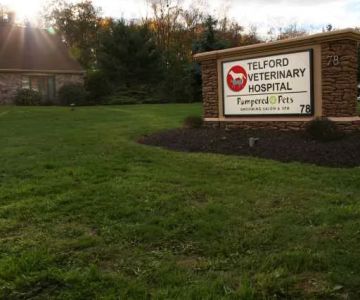Do Bulldogs Need Routine Veterinary Care and Vaccinations?
- 1. Bulldog Health: Why Routine Veterinary Care is Essential
- 2. The Importance of Vaccinations for Bulldogs
- 3. Common Health Issues in Bulldogs and How Routine Care Helps
- 4. Recommended Vaccination Schedule for Bulldogs
- 5. Personal Experience: Caring for My Bulldog
- 6. Top Tips for Ensuring Your Bulldog’s Health
If you are a bulldog owner or considering adopting one, you may wonder about the importance of routine veterinary care and vaccinations. Bulldogs are wonderful, loyal companions, but like any breed, they have unique health needs. In this article, I will explain why routine veterinary care is essential for bulldogs, the importance of vaccinations, common health issues that bulldogs face, and how you can ensure your bulldog stays healthy with the right care.

78 Souderton Hatfield Pike, Souderton, PA 18964, USA
See Details1. Bulldog Health: Why Routine Veterinary Care is Essential
Bulldogs, with their distinctive appearance and affectionate nature, are one of the most popular dog breeds worldwide. However, their unique features, such as their short snouts and compact bodies, can lead to specific health concerns that require regular veterinary attention. Routine veterinary care is vital in detecting and preventing common health issues, ensuring your bulldog’s well-being for many years to come.
Regular visits to the vet help in the early detection of potential issues such as hip dysplasia, skin allergies, respiratory problems, and dental disease, which are common in bulldogs. I’ve personally found that keeping up with regular vet appointments has been essential in keeping my bulldog healthy and happy. Each visit provides an opportunity to discuss his overall health, get advice on nutrition, and ensure he’s up-to-date with vaccinations.
In addition to preventative care, routine visits to the vet ensure your bulldog is at an optimal weight, receive advice on exercise, and have any potential concerns addressed. The importance of establishing a relationship with a trusted vet cannot be overstated—it becomes crucial when your dog faces health issues or needs emergency care.
2. The Importance of Vaccinations for Bulldogs
Vaccinations play a critical role in protecting your bulldog from a variety of potentially deadly diseases. These diseases, such as parvovirus, distemper, and rabies, can cause severe illness or even death. Fortunately, vaccinations are available to prevent these diseases, making them a key part of your bulldog's healthcare routine.
For example, I remember when I first got my bulldog, I was advised by my vet to make sure he had his first round of vaccinations as early as possible. I learned that the protection provided by vaccinations extends not only to the dog but also to humans in the case of zoonotic diseases, such as rabies. Keeping up with the vaccination schedule is essential for ensuring your bulldog’s health and for complying with local pet health laws.
Vaccinations also help protect the broader community of animals. By ensuring that your bulldog is vaccinated, you contribute to herd immunity, which prevents the spread of dangerous diseases. For bulldog owners, keeping track of vaccination dates is vital, and your veterinarian can guide you on the necessary vaccines and when to schedule them.
3. Common Health Issues in Bulldogs and How Routine Care Helps
Bulldogs, like all breeds, are prone to certain health issues. Many of these issues are related to their physical structure, making routine veterinary care even more crucial. Some common health concerns that bulldogs face include:
- Brachycephalic Syndrome: Bulldogs have short snouts, which can cause breathing difficulties. This condition can lead to problems with airways, making it harder for them to breathe, especially during hot weather or vigorous exercise. Regular vet visits ensure that any breathing issues are detected and managed early.
- Skin Conditions: Bulldogs are known for their wrinkled skin, which can lead to skin infections, rashes, and fungal infections. Keeping their skin clean and free from moisture is essential, and a veterinarian can recommend products to maintain healthy skin.
- Hip Dysplasia: This is a common condition in bulldogs, where the hip joint does not develop properly, leading to pain and mobility issues. Regular checkups allow the vet to monitor joint health and recommend solutions to prevent further damage.
- Dental Issues: Bulldogs are prone to dental issues, such as tartar buildup, gum disease, and tooth decay. Regular dental checkups and cleaning can prevent more serious oral health problems from developing.
Routine veterinary care ensures that any of these conditions are addressed early, preventing further complications and improving your bulldog’s quality of life. Regular checkups help ensure that your bulldog remains active and healthy, despite the challenges posed by these common issues.
4. Recommended Vaccination Schedule for Bulldogs
When you bring a bulldog into your home, it’s important to follow a vaccination schedule to protect them from various diseases. The typical vaccination schedule for puppies includes a series of vaccinations starting at six to eight weeks of age. These vaccines often include:
- DHPP Vaccine: Protects against distemper, hepatitis, parainfluenza, and parvovirus.
- Rabies Vaccine: Protects against rabies, a deadly disease that affects both animals and humans.
- Bordetella Vaccine: Also known as the kennel cough vaccine, it’s essential for bulldogs who may be exposed to other dogs in public places.
As your bulldog grows, they will need booster shots to maintain immunity. Your veterinarian will provide you with a personalized vaccination schedule based on your dog’s age, lifestyle, and any specific health risks. Staying on top of these vaccinations ensures that your bulldog is protected from preventable diseases, keeping them safe and healthy.
5. Personal Experience: Caring for My Bulldog
When I first adopted my bulldog, I didn’t fully understand how important routine veterinary care would be for his overall well-being. Over time, I’ve learned that regular vet visits are crucial in maintaining his health. From keeping him up-to-date on vaccinations to addressing common health issues like skin infections and joint problems, my vet has been an invaluable resource. I’ve also learned that preventive care is key in avoiding costly treatments down the road.
For example, a couple of months ago, I noticed my bulldog’s skin starting to look a little red and irritated around his wrinkles. I immediately took him to the vet, and the issue was diagnosed as a mild skin infection that required topical medication. Thanks to routine checkups, the condition was caught early, and my bulldog made a full recovery in no time. It was a relief to know that regular veterinary care played such a significant role in catching these issues before they became more severe.
6. Top Tips for Ensuring Your Bulldog’s Health
As a bulldog owner, there are several steps you can take to ensure your dog stays healthy, in addition to routine vet visits:
- Maintain a Healthy Diet: Bulldogs are prone to obesity, so it’s important to feed them a balanced diet and avoid overfeeding. Consult with your vet to determine the best food for your bulldog’s age and activity level.
- Keep Their Wrinkles Clean: Bulldogs are notorious for their wrinkles, which can trap moisture and bacteria. Regularly clean and dry your bulldog’s wrinkles to prevent skin infections.
- Provide Regular Exercise: While bulldogs are known for being a bit lazy, regular exercise is essential to maintain a healthy weight and prevent joint issues. Short walks and light playtime are perfect for keeping your bulldog active.
By following these tips and maintaining regular veterinary care, you can help your bulldog live a long, healthy life. If you're looking for more information on keeping your bulldog healthy or finding the best vet care in your area, be sure to visit Four Dollar Jacks for expert advice and services tailored to your needs.










